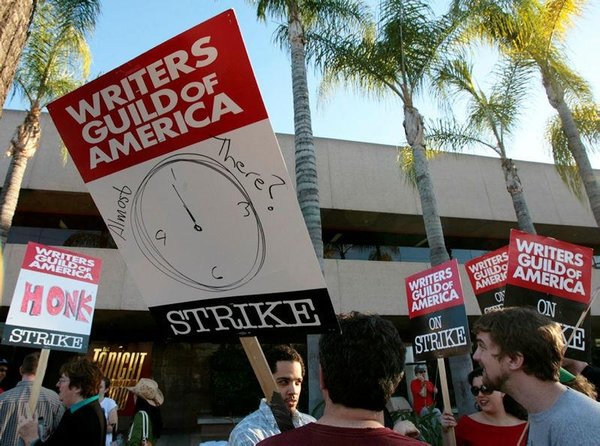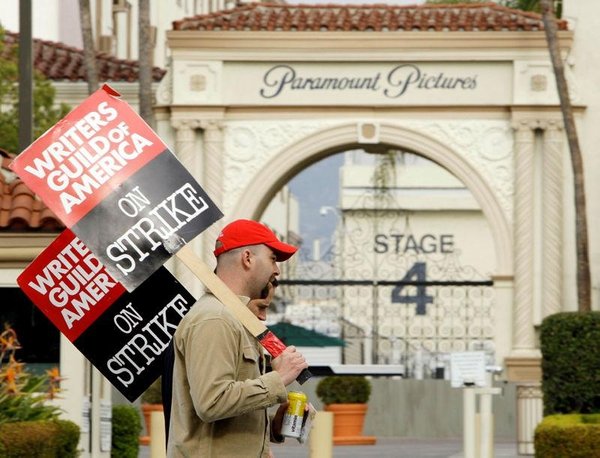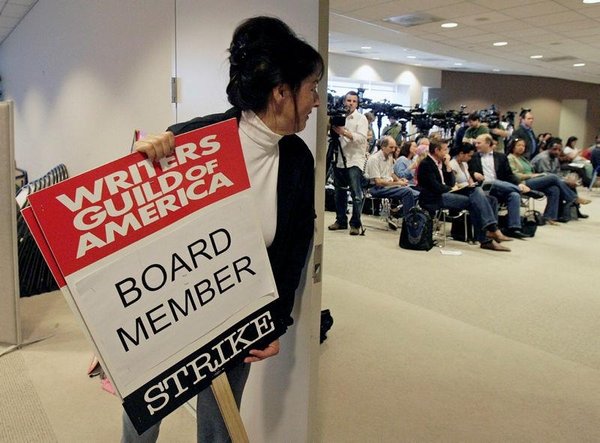The clock is ticking on negotiations between television and film writers and producers before their contract expires.
A strike could begin Tuesday morning, forcing writers to begin picketing. That would send late-night television shows, and eventually other series, into reruns.
The Writers Guild of America and the Alliance of Motion Picture and Television Producers have been negotiating off and on since March 13 but have been unable to reach an agreement on a new contract. The main sticking points are compensation and health care.
The last writers strike spanned 100 days in late 2007 and early 2008 and was costly for both television viewers and the California economy.
Since then, the television landscape has changed with the rise of streaming services and shows adopting shorter television seasons.

In Feb. 8, 2008 file photo, members of the Writers Guild of America talk about the possibility of a new contract, as they walk on the picket line at NBC Studios in Burbank, Calif. Hollywood is facing a cliffhanger after members of the Writers Guild of America voted overwhelmingly to authorize a strike that could begin as soon as May 2, the day after the current contract ends. The previous writers’ strike lasted 100 days in 2007-08 and was costly to the businesses that serve Hollywood and to consumers expecting to be entertained. (AP Photo/Damian Dovarganes)
WHAT WILL A HOLLYWOOD WRITERS' STRIKE MEAN?
Negotiations aimed at preventing a crippling strike by Hollywood movie and TV writers are down to the wire.
That the Writers Guild of America and the Alliance of Motion Picture and Television Producers kept talking over the weekend as the Monday-night deadline neared was a hopeful sign.
But with both sides observing a strict news blackout, there was no official indication of how close they could be to a deal on key issues including compensation and health care.
The previous writers' strike lasted 100 days in 2007-08 and was costly to the businesses that serve Hollywood and to consumers expecting to be entertained.
A walkout's impact would come in waves and affect different parts of the industry differently. Here's a look at how it could play out if writers trade their laptops for picket signs.

In Jan. 23, 2008 file photo, striking film and television writers picket outside Paramount Studios in Los Angeles. Hollywood is facing a cliffhanger after members of the Writers Guild of America voted overwhelmingly to authorize a strike that could begin as soon as May 2, the day after the current contract ends. The previous writers’ strike lasted 100 days in 2007-08 and was costly to the businesses that serve Hollywood and to consumers expecting to be entertained. (AP Photo/Kevork Djansezian)
THE ISSUE
The changing nature of how television is delivered to viewers is a major reason for the impasse.
More than 400 series were available on broadcast, cable and rapidly expanding streaming platforms this season, double that of six years ago. But shows have fewer episodes than the roughly two dozen per season once common on network TV, and short runs of as few as eight to 12 episodes mean less money for writers getting paid on a per-episode basis.
Contracts binding writers exclusively to a series have cut into their compensation as well.
According to the WGA, which has about 20,000 members, median earnings for writers dropped between the 2013-14 season and 2015-16, and more and more scribes are finding it difficult to make a living under current deals.
The guild is seeking a wage increase and wants salary minimums to apply equally to streaming, cable and broadcast. Health care, an issue that echoes beyond Hollywood, also is on the table. The two sides are at odds over what concessions the guild would make in return for producers contributing more to the health plan.

In Feb. 10, 2008, file photo, Writers Guild of America board member Nancy De Los Santos, who's also a film and television writer, waits for a news conference to start in Los Angeles. Members of the Writers Guild of America are one step closer to striking come May 2, 2017. In a letter to its members Monday, April 24, the WGA said 96.3 percent voted to authorize a strike as the May 1 contract expiration deadline looms. (AP Photos/Ric Francis)
TELEVISION
TV viewers won't be laughing much if writers take a hike, with the most immediate impact on late-night talk and comedy shows including "Saturday Night Live."
In the 2007 walkout, shows including NBC's "Tonight" and CBS' "The Late Show with David Letterman" went dark for two months. They returned during the strike either without writers or, in Letterman's case, with a separate guild deal through his production company. That won't be an option for CBS' current "Late Show" host Stephen Colbert because a CBS entity now produces it.
For prime-time TV, the strike would come as the fall-to-spring broadcast season winds down. But with year-round programming now commonplace, networks and cable channels likely will call on reality shows to help fill the void.
Reruns, sports and news — especially given ratings-grabbing Trump administration coverage — also would be key, said entertainment lawyer Jonathan Handel.
Streaming services such as Netflix and Amazon could be winners because their original series tend to be produced further in advance of release, Handel said.
THE BIG SCREEN
The slower pace of film production, where it takes up to three years or more for the biggest movies to be made, means a strike wouldn't cause as much immediate havoc in the movie business. But it would still greatly alter the well-ordered pipelines of Hollywood productions, big and small.
Most significant would be the impact on large franchises that might not have a script quite ready for shooting. That leaves studios with a choice of whether to press pause on a franchise or push ahead with an unfinished screenplay.
The 2007 strike affected the making of movies like "X-Men Origins: Wolverine," the James Bond film "Quantum of Solace" and "Transformers: Revenge of the Fallen." All of those films received poor reviews, and many of the filmmakers and stars involved later said the movies simply didn't have the screenplay or the writers that they needed.
Some films will be rushing to get scripts ready before any potential strike, but others will inevitably be left in limbo.
Screenwriter and WGA member David Atkins, who teaches film and TV at Quinnipiac University in Connecticut, said he's feeling the squeeze already.
He and a writing partner have a script ready to sell but "it's an extremely awkward time" with a possible strike looming, he said. "We've decided not to move forward at this point, to wait and see what happens."
DOLLARS AND CENTS
The 100-day writers' strike that started in late 2007 cost the California economy an estimated $2 billion, with the Los Angeles area the hardest hit. The entertainment industry at that time contributed $58 billion a year for the area's economy.
That has grown to $83 billion as of 2014, according to a report by Los Angeles County's Economic Development Corp.
The producers group on the other side of the bargaining table said the 2007-2008 strike meant $287 million in lost compensation for writers.
CBS said then that TV ad revenue fell 15 percent, hurt by the strike and other factors. But Walt Disney Co., which owns ABC, said international sales of shows offset ad-sales losses.